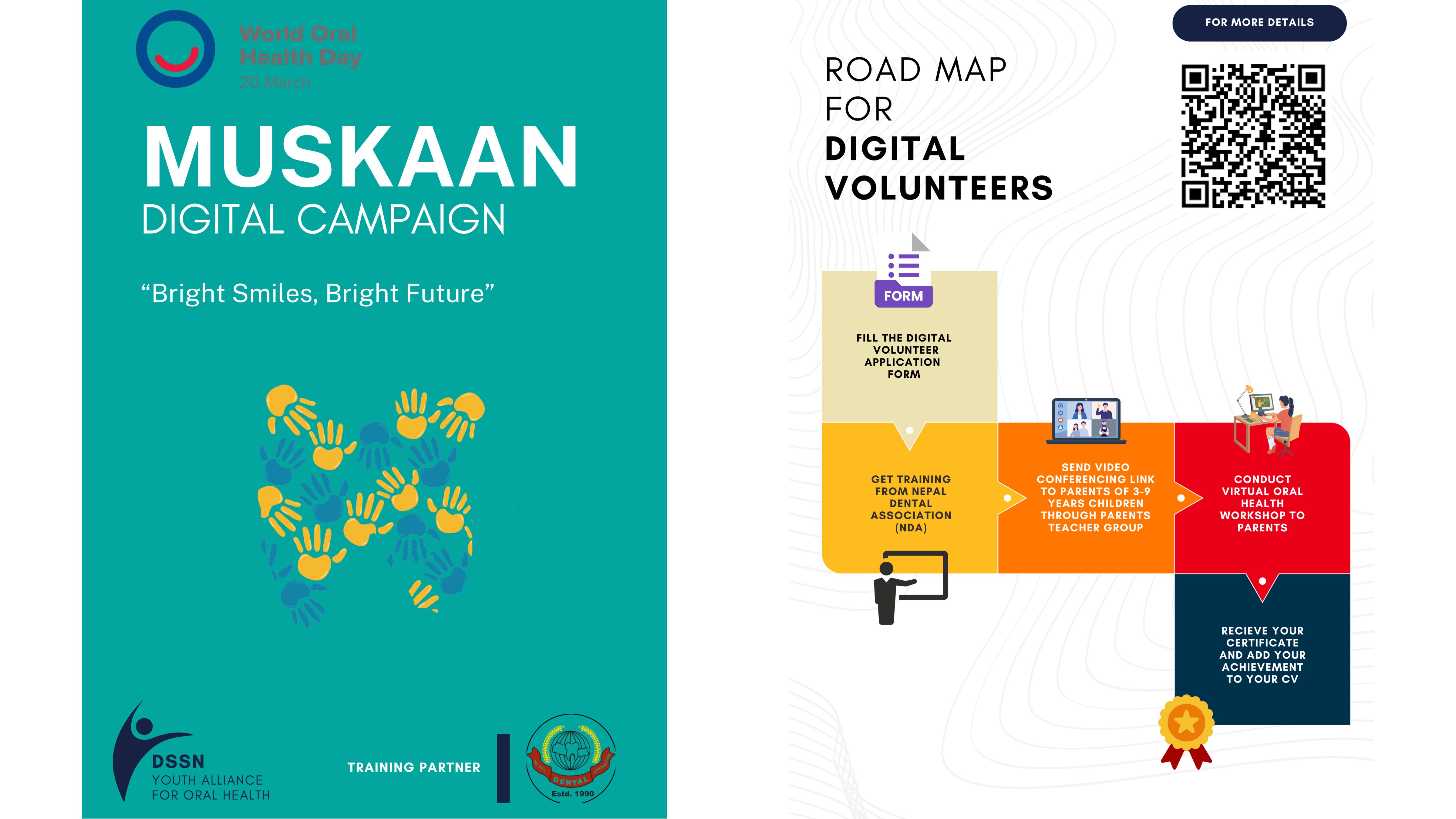
Background
The World Health Organization global oral health report shows approximately 3.5 billion people suffering from oral diseases and conditions which makes it the non-communicable disease with the highest prevalence worldwide. Moreover the lower- and upper-middle income countries contribute three quarters in overall global prevalence. Nepal, a lower income country also shows striking data with a huge burden of oral disease among its population. To tackle this public health issue WHO has drafted a Global strategy and action plan on oral health 2023-2030 that keeps oral health promotion and oral disease prevention as one of the strategic objectives with action plans for civil society organizations focusing on action to community oral health promotion. Nepal Oral Health Country Profile reveals 51.6% of prevalence of dental caries in children 3-9 years and similar data comes out when it comes to caries in permanent dentition, periodontal disease and edentulism. To combat this, health promotion through parental education can play a crucial role. Studies indicate that parental education programs significantly improve children's health outcomes by equipping parents with the knowledge and skills to create a healthy home environment (Jones et al., 2021)
Every year March 20 is celebrated as World Oral Health Day (WOHD). The celebration encourages individuals, dental professionals, and policymakers to take action in improving oral health globally.
Why Digital?
As we move towards digital advancement, utilization of digital tools becomes important and needs to be taken into consideration in every project we think about. After the COVID-19 breakdown, most of the parents and childrens have become familiar with digital tools and technology increasing digital literacy. Recognizing this, WHO has also published implementation guidelines for mobile technology for oral health. The mOral Health literacy module of the implementation guideline aims to improve oral health literacy and increase good oral health behaviour of individuals and communities.
Utilizing digital tools and video conferencing technology we can reach larger audiences. Even all the family members can be present at the same time, when a virtual oral health workshop is being given.
4. Objectives
To train teachers and parents on the importance of oral health and preventive care.
To organize interactive video conferencing sessions using digital volunteers to train the families and help solve their oral health concerns.
Target Audience
Parents and teachers of children of 3-9 years old.
The parents of this age group have been targeted as they can act as intermediaries for this group.
Campaign Date
March 20- April 2
Implementation Plan
Initiation Phases
Defining Goals and Objectives
Identify possible stakeholders
Identify resources and constraints
Create a team with specific roles and designation
Prepare initial concept note
Planning Phase
Make a detailed project implementation plan with a detailed list of tasks with role division, timeline, resource allocation.
Plan the final budget.
Design the awareness contents
Recruit the Digital volunteers
Execution Phase
Digital Volunteers’ Training
Printings of Awareness pamphlets
Coordinating with stakeholders for implementation of project
Implement main activity of the project
Monitoring Phase
Track the Progress of the project
Evaluate the participation
Make necessary changes and plan if necessary
Closure Phase
Evaluate the success of the project
Discuss the impact of the project
Make the official report of the project
Make necessary backup of the information and project details
Officially close the project
Activity Summary
Step 1: Digital Volunteers will be hired which will consist of dental students, young dental professionals, medical and public health students.
Step 2: Standard Awareness material will be created by our content creation team under the guidance of experts.
Step 3: Training session will be conducted by Experts to digital volunteers at the same time approaching various school administrations to reach out parents and teachers of school going children through parents- teachers online group.
Step 4: Conduction of virtual oral health workshops by digital volunteers to target audiences.
Sustainability of the Project
This project has the potential for long-term impact by instilling positive oral health habits in children and creating a community culture around preventive care. Teachers and parents trained during the program can continue to reinforce these practices. Future collaboration with local government and schools will ensure the project's scalability and integration into broader health initiatives
Outcome of the campaign
Increased oral health awareness among parents, teachers and students.
Serve as the pilot campaign for a longer term larger campaign.
27.7103145, 85.3221634
Information
Kathmandu, Nepal
Kathmandu, Nepal
Kathmandu 44600
Nepal
